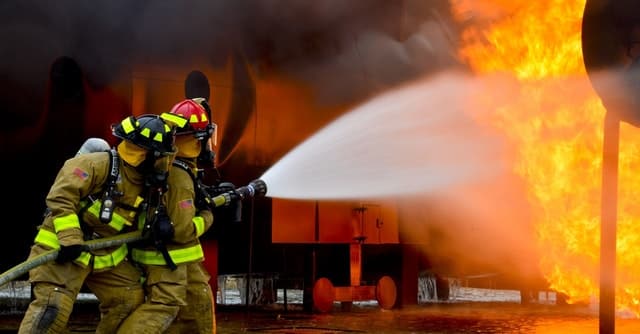Few things are more frightening than being awakened in the middle of the night by a house fire.
But what if you weren’t awakened?
That’s a real concern for people with hearing loss in Katy, who are less likely to be able to hear the smoke detector.
Hearing Loss & High Frequencies

There is little doubt that smoke alarms save lives.
Since their introduction in the late 1960s, fire-related fatalities dropped from 10,000 a year to about half that number by the 1990s.
It’s no wonder R&D Magazine readers voted smoke alarms as one of the “30 Products that Changed Our Lives.” Unfortunately, they aren’t always loud enough to warn people with hearing loss.
Traditional smoke alarms emit signals averaging 3,150 Hz.
This is plenty loud enough to awaken people with normal hearing but won’t necessarily do the trick for hearing-impaired individuals.
Hearing loss usually affects the higher frequencies, making it difficult to hear high-pitched sounds.
It’s why folks have more trouble understanding women and children, whose voices are generally higher.
Smoke Alarm Solution for Hearing Impaired
The solution would be a smoke detector that delivers sounds around 520 Hz.
A study by the Fire Protection Research Foundation (FPRF), a nonprofit group that gathers data on fire and building safety, found that smoke alarms in that range were considerably more effective at waking people with hearing loss.
Their results, published in a 2007 paper titled Waking Effectiveness of Alarms for Adults Who Are Hard of Hearing, found that conventional detectors awakened 57 percent of test subjects.
Low-pitched alarms, by contrast, woke up 90 percent of participants at the minimally-acceptable fire code sound level of 75 decibels for 30 seconds.
Even more impressive? At 95 decibels, every single person woke up.
Clearly, a low-frequency smoke detector would be far more effective at alerting people with hearing loss in Katy to danger.
Unfortunately, such devices aren’t currently available.
Part of the problem may be that most investigations into fire-related fatalities do not look at potential hearing disabilities as a contributing factor, so few are aware of the dangers and there is little urgency on the part of manufacturers to come up with alternatives to a product that has been clearly demonstrated to save a significant number of lives.
FPRF director Kathleen Almand hopes her group’s study will help convince manufacturers of smoke detectors and other alerting devices to develop products in the 500 Hz range.
Until such devices become available, it’s important to understand your rights.
Under the Americans with Disabilities Act (ADA), hotels, motels and other public facilities that provide sleeping accommodations are required to provide effective access to the buildings alarm system for hearing-impaired or disabled guests.
If you are booking a room and that service is not available, you can file a complaint at www.ada.gov.
In the meantime, your Katy audiologist is happy to give you tips on improving your safety if you are experiencing hearing loss.
Related Hearing Loss Posts:
- How to Overcome Listening Fatigue
- Hearing Loss Can Lead to Feelings of Depression
- Which Plays a Bigger Role in Hearing: Your Ears or Your Brain?
Our Katy Audiologist Office Location
Katy
21715 Kingsland Blvd
Katy, TX 77450
(281) 578-7500